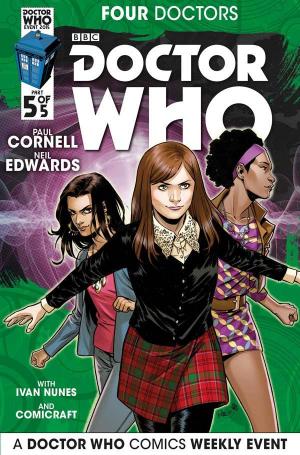 WRITER - PAUL CORNELL
WRITER - PAUL CORNELLARTIST - NEIL EDWARDS
COLORIST - IVAN NUNES
LETTERER - RICHARD STARKINGS AND JIMMY BETANCOURT
DESIGNER - ROB FARMER
EDITOR - ANDREW JAMES
ASSISTANT EDITOR - KIRSTEN MURRAY
RELEASED SEPTEMBER 23RD 2015, TITAN COMICS
Although he couldn’t have known this at the time of writing, in having Missy utter these pivotal words towards the climax of “The Witch’s Familiar” last Saturday, Doctor Who’s resident commander-in-chief Steven Moffat almost directly alluded to the discussion point which has arguably been at the heart of Paul Cornell’s grand Four Doctors crossover event: precisely what role do the travelling companions who join the TARDIS crew play in Theta Sigma(s)’ lives, and must we always assume that their impact upon the aforementioned mad man in a box is wholly beneficial? Certainly, there’ve been examples in the past of the Doctors’ allies failing to live up to his occasionally lofty expectations – few would likely contest the hypothesis that Adam Mitchell didn’t do himself any favours in 2005’s “The Long Game”, for instance – and one has to wonder, based on the events of 2009’s “The Waters of Mars” amongst other companionless tales, whether the increasingly fleeting nature of each assistant’s tenure takes its toll upon the series’ one constant protagonist from time to time, but not until now has this intellectually stimulating subject matter been considered any great detail, hence why – in spite of its various shortcomings, déjà vu-ridden sequences perhaps the most prominent bugbear – Titan Comics’ first Who-centric Summer event has made for such delightfully entertaining reading to date.
For those who’ve been struggling to stay abreast of what’s undoubtedly been one of the more convoluted entries in the Whoniverse’s ever-expanding array of time-bending yarns, at the heart of Cornell’s contemplation upon the relationship between the Doctor and his accomplices – better known as the character dynamic which continues to power the programme and its various spin-offs fifty-two years after the former’s inception – lies an alternate version of Peter Capaldi’s Twelfth Doctor whose (admittedly already flimsy) moral compass had the misfortune of becoming completely warped at the moment that his Impossible Girl elected to betray him in Season Eight’s much-loved “Dark Water”. Not only that, but rather than live out his days as his previous selves did, namely by searching the universe in search of new recruits, this Valeyard-esque parallel echo opted to voyage across dimensions so as to join forces with the Time War-afflicted Voord and spread an indoctrinatory message of peace across the cosmos.
Keeping up? If not, then fret not, since rather than continually prioritising his narrative’s dense techno-jargon and complex mythology as was the case on occasion in previous issues, Cornell instead takes the approach which worked wonders for him in 2007 with “Human Nature / The Family of Blood”, bringing the relationship at the tale’s heart (in the aforementioned televised serial’s case John Smith and Joan Redfern, though here it’s undeniably the Doctor and Clara) back to the forefront just in time to allow for a real humdinger of an emotional denouement. Precisely how Four Doctors concludes we shan’t of course spoil here for fear of robbing anyone of the satisfaction of experiencing Issue 5 devoid of any foreknowledge, yet suffice to say that the manner in which the piece’s psychologically unhinged ‘villain’ rounds off his dialogue with Coal Hill School’s least reliable teacher since the 1960s will surely bring a tear to both eyes, especially given how neatly the moment complements the true Twelfth’s televised reaction to his friend’s ultimately insignificant backstabbing in the process.
Jenna Coleman’s soon-to-be deceased (unless she overcomes her addiction to adventuring, of course) construct isn’t the only companion involved in drawing Cornell’s meticulously plotted five-part saga to a close, however – Gabby Gonzalez and Alice Obiefune both factor into its resolution just as heavily as Clara and Missy did into “The Witch’s Familiar”, despite all four characters seemingly having met their demises in their respective tales’ previous instalments. Indeed, this reviewer couldn’t be more relieved to confirm that whereas Four Doctors’ penultimate chapter cruelly mishandled the former pair by only having them fulfil a somewhat meaningful role at the very last moment, Issue 5 in contrast affords both of them pivotal roles, with Gabby in particular heading on a trajectory which couldn’t be more vital in terms of how proceedings wrap up. Perhaps another entry in Gabby’s frequently marvellous series of diary writings would have sweetened the deal even further so far as boosting her and Alice’s enhanced contributions, but even so, it’s nothing short of fantastic to see the scribe take heed – at precisely the right moment, too – of the fact that successful Who serials pay just as much attention to the exploits of the Time Lord’s invaluable assistants as to the show’s namesake.
Speaking of the word “fantastic”, it’s high time that we addressed the singular, big-eared elephant still residing in the room a month on from this otherwise blemish-free (well, thereabouts) storyline – the absence of Chris Eccleston’s Ninth Doctor. Rest assured that whilst Cornell doesn’t suddenly shoehorn in the first of the character’s post-20th Century incarnations in a desperate effort to rival the five or so issues which Titan have already dedicated to him this year, by no means does he outright ignore the huge extent to which the Oncoming Storm and Rose Tyler developed upon the interactions between past Doctors and companions; quite to the contrary, he uses the fact that Eccleston’s war veteran seemingly spent virtually all of his life in Rose’s company to both justify their joint disappearance (of sorts) and progress the finale’s above-mentioned contemplation of the supplemental and detrimental ramifications (particularly the latter) alike of its central players’ dependence upon one another.
In just about any other isolated Who comic-book arc, such a fleeting sequence as that which we’ve vaguely (albeit with good reason) commented on here would doubtless come off as an indulgent digression intended to evoke little more than a sense of nostalgia in the mind of the hard-core Whovian reader, so it’s incredibly telling of Cornell’s near-unparalleled finesse as a spinner of yarns that he takes the moment in question and utilises it not only as a means by which to celebrate the highlights of Doctor Who’s modern revival ten years on from its debut, but moreover to immensely deepen our understanding of how the Doctor’s companions continue to keep his darker moral facets at bay. Matt Smith’s incarnation once speculated in the presence of Sarah-Jane and Jo that the universe might just shiver in the event of his demise, yet on the basis of Four Doctors’ captivating fifth part, it seems safer still to say that if the 2000-year-old Time Lord ever took permanent leave of his travelling assistants, the universe – not to mention the audience – would surely require therapy as a result.

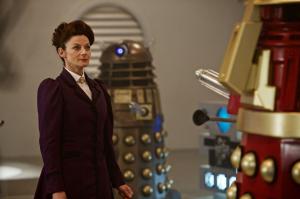 Written by
Written by 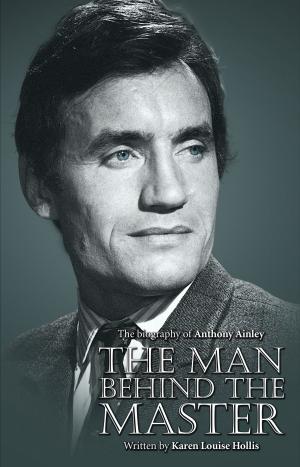
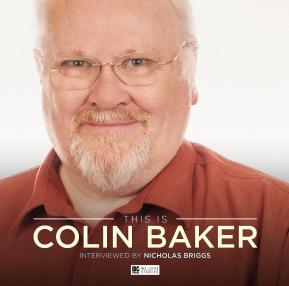 Colin Baker, Nicholas Briggs (Interviewer)
Colin Baker, Nicholas Briggs (Interviewer)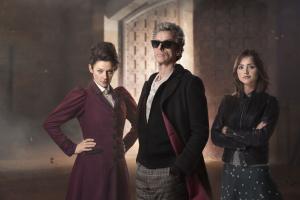
 Starring: Tom Baker, Louise Jameson, John Leeson, Frazer Hines, Michael Cochrane, Bernard Holley, Veronica Roberts, and Nicholas Briggs
Starring: Tom Baker, Louise Jameson, John Leeson, Frazer Hines, Michael Cochrane, Bernard Holley, Veronica Roberts, and Nicholas Briggs 
 Starring: Sylvester McCoy (The Doctor), Bonnie Langford (Mel), Phillip Franks (Superviser/Acolyte), Dille Keane (Lydek), Clare Buckfield (Ann/Darl), Barry McCarthy (Fred/Terminal), Anna Bentinck (Jean/Computer), Barnaby Edwards (Reef)
Starring: Sylvester McCoy (The Doctor), Bonnie Langford (Mel), Phillip Franks (Superviser/Acolyte), Dille Keane (Lydek), Clare Buckfield (Ann/Darl), Barry McCarthy (Fred/Terminal), Anna Bentinck (Jean/Computer), Barnaby Edwards (Reef)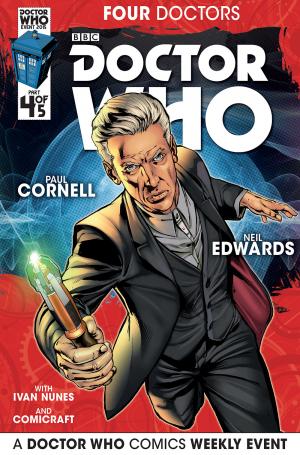 WRITER - PAUL CORNELL;
WRITER - PAUL CORNELL; Writer - Paul Cornell,
Writer - Paul Cornell,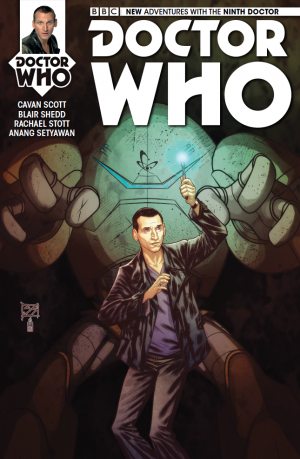 Writer - Cavan Scott
Writer - Cavan Scott Circle us on Google+
Circle us on Google+